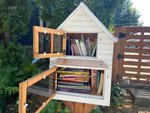
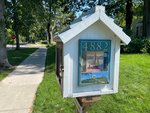
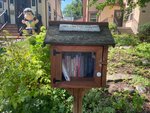
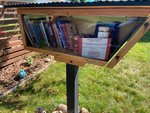
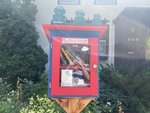
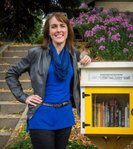
Little Free Library (LFL) is working on programs to address access to books. This includes the Read in Color Initiative, partnering with Banned Books Week Coalition, and the Indigenous Library Program in order to protect the right to read.
“Our vision is a Little Free Library in every community and a book for every reader,” said LFL Director of Communications Margret Aldrich, who is a Fulton resident. “We believe all people are empowered when the opportunity to discover a personally relevant book to read is not limited by time, space, or privilege.”
The St. Paul-based non-profit has been awarded the World Literacy Award and Candid’s respected Platinum Seal of Transparency, as well as recognition from the Library of Congress, the National Book Foundation, the Women’s National Book Association, and more. There are more than 150,000 libraries worldwide and more than 150 of those are in Minneapolis.
How do you foster new Little Free Libraries?
Aldrich: Little Free Libraries are established by volunteer stewards, either individuals or organizations. We welcome roughly 15,000 Little Free Libraries and stewards to our network every year.
To start a Little Free Library, you can build your own and register it with us or you can purchase a kit or finished library from the LFL organization. (Registered Little Free Libraries have a sign with a unique charter number.) Registration for the library costs $40 while buying a prebuilt library with registration included starts at $180.
What is the process of granting a library?
Aldrich: Those in under-resourced communities can apply to receive a Little Free Library at no cost through our Impact Library Program. Through this program, we grant little libraries full of books at no cost to areas where books are scarce.
We review these applications monthly and award these library grants on a rolling basis. This program is funded by individual and corporate donors. However, in 2021 we were only able to grant libraries to 22 percent of the applications we received. We would love to be able to grant books and Little Free Libraries to every applicant.
How do you make sure the libraries include diverse books?
Aldrich: We launched the Read in Color initiative in 2020. Through Read in Color, we bring diverse books to Little Free Library book-sharing boxes across the country. Read in Color distributes books that provide perspectives on racism and social justice; celebrate BIPOC, LGBTQ+, and other marginalized voices; and incorporate experiences from all identities for all readers.
When George Floyd was murdered, we worked with our community to develop Read in Color to help create meaningful change. Minneapolis was the first Read in Color city. Since then, Read in Color expanded nationwide to 11 additional cities with more on the way! In total, nearly 200 Little Free Libraries have been established in high-impact areas and 40,000 diverse books have been shared. Our Read in Color recommended reading lists include selections from Asian American, Black, Indigenous, Jewish, Latinx, LGBTQ+, Muslim, and other important communities.
How is LFL addressing book bans?
Aldrich: Banning books goes against everything Little Free Library stands for. We are committed to expanding book access, not shrinking it. This year we partnered with the Banned Books Week Coalition, HarperCollins Children’s Publishing, Bookshop.org, and the American Library Association to celebrate the right to read and provide resources for those combatting book bans. We were thrilled that Harper Collins generously donated 1,000 banned books to stewards in the Little Free Library network.
Why does it matter that there is access to books?
Aldrich: Everyone deserves a book to read. There are more than 150,000 registered Little Free Library book-sharing boxes around the world – in all 50 states, 115 countries, and on all seven continents. Through them, more than 250 million books have been shared. By providing greater, more equitable book access in neighborhoods worldwide, we work to strengthen communities and influence literacy outcomes. Books in the hands of children improve literacy rates. The more books in or near the home, the more likely a child will learn and love to read.
Talk about the Indigenous Library Program
Aldrich: Through this initiative, Little Free Library grants no-cost book-sharing boxes where needed most on tribal lands and in Indigenous communities in the United States and Canada. We work with Indigenous community leaders and members to place book exchanges in locations where book access is important to improving literacy. In tribal communities, book access is a challenge, as most do not have their own public libraries. Often, literacy rates suffer. Little Free Library book exchanges are a great vehicle for easy access to books.
How can people help?
Aldrich: Monetary donations to LittleFreeLibrary.org are hugely impactful for getting books and Little Free Libraries to the communities that need them most. You can also help by sharing high-quality books in the Little Free Libraries in your community. Find a Little Free Library near you by downloading our mobile app!
Comments
No comments on this item Please log in to comment by clicking here